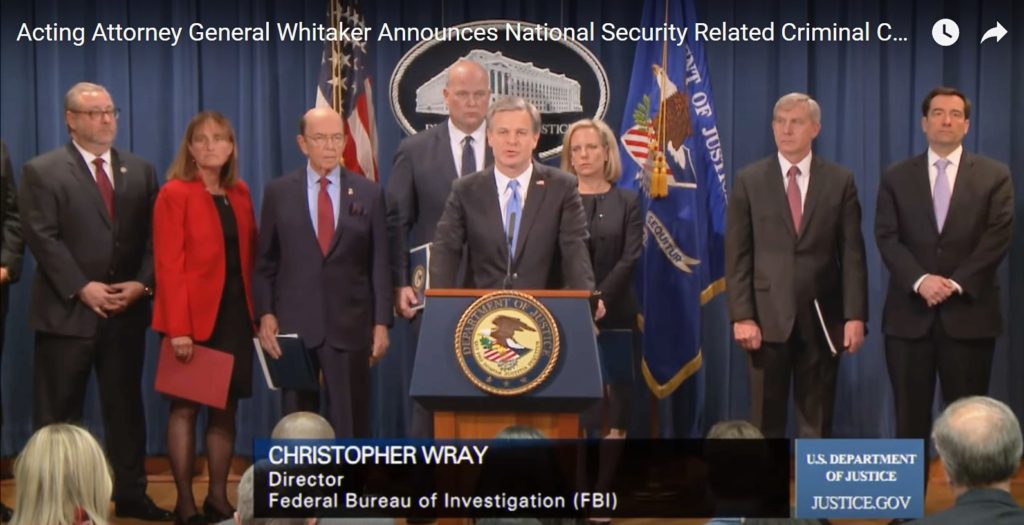- New book explores Canada’s dangerous offender designation - January 11, 2022
- Canada’s extradition laws under attack for many reasons in 2021 - December 24, 2021
- Canada’s extradition procedures in desperate need of an overhaul - November 24, 2021
By Paul Russell, LegalMatters Staff • Fresh indictments against Chinese telecommunications giant Huawei should not be a factor in deciding if the company’s top financial executive can be extradited from Canada to the United States to face fraud-related charges, says British Columbia criminal lawyer Gary Botting.
CFO Meng Wanzhou was arrested by Canadian authorities on a stopover at Vancouver International Airport in December 2018, he says, at the request of the U.S. Department of Justice, which claims she lied to Hong Kong bank executives in 2013 about Huawei’s ownership of an Iranian subsidiary that attempted to sell computer equipment, a violation of U.S. economic sanctions.
“But Canada has never been part of those sanctions,” says Botting, principal of Gary N.A. Botting, Barrister and Solicitor. “Instead we have endorsed UN sanctions, which are a lot less restrictive than the American ones.”
Because Meng’s alleged actions in Hong Kong would not be a crime in Canada, he says her lawyers have argued this case doesn’t meet the international standard of double criminality, and she should be released.
‘Very good chance’ Meng Wanzhou will be set free
The substantive part of that hearing has now wrapped up, Botting says, with a ruling expected in the coming months.
“I think there is a very good chance there will be a finding that dual criminality does not exist in this case, and she will be free to go,” he says. “If that happens, the U.S. Attorney General can appeal that decision, but I think that would be a very foolhardy thing to do.”
Botting explains that double criminality normally involves serious crimes that most nations recognize, such as theft, robbery, kidnapping or murder.
“The underlying allegation is that the representations she allegedly made in Hong Kong could have led, but not actually led, that bank to violate U.S. sanctions against Iran, which is rather a stretch,” he says.
Botting notes that Prime Minister Justin Trudeau and Justice Minister David Lametti have said they cannot get involved in this case because they did not want to interfere with the rule of law.
“Their positions are patently ridiculous,” he says. “Section 23 of the Extradition Act clearly states the minister of justice has the discretion to stop extradition proceedings whenever he wants, and the courts must comply with that decision.”
Misunderstanding ‘rule of law’
Botting says the Canadian government is interpreting the concept of “rule of law” differently than others.
“When we talk about the ‘rule of law,’ that simply means that no one is above the law,” he says. “It doesn’t mean that cases like these have to be decided by the courts first, as the Extradition Act clearly gives jurisdiction to the minister of justice in this area.”
Botting — who has represented clients primarily in extradition, dangerous offender law and criminal appeal cases for more than 25 years – has frequently been approached by media outlets for his views on this case.
When new indictments against Huawei were handed down last week by U.S. officials, The New York Times sought out his opinion, with Vancouver’s Global TV sending over a camera crew to his home later that day.
“I told them both that the new indictments, alleging Huawei stole intellectual property and that it was doing business with North Korea, should have absolutely no effect on Madame Meng’s extradition hearing,” he says. “There is no new jeopardy for her.”
Botting says the principle of dual criminality offers protection to individuals who otherwise would be exposed to arbitrary extradition simply upon the demand of a treaty partner.
He says this principle predates Canada’s Extradition Act, which passed into law in 1999.
“Just because something is a breach of American law does not make it a breach of Canadian law,” Botting says. “The United States cannot be the police force for the entire world.”
Nonetheless, he says Canada has a “staggering” 99 per cent rate of compliance in extradition cases originating from the United States.
“This, of course, is a cheap way of keeping our biggest trading partner happy,” Botting says.

